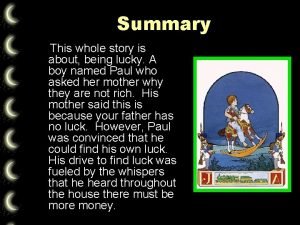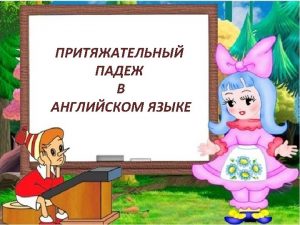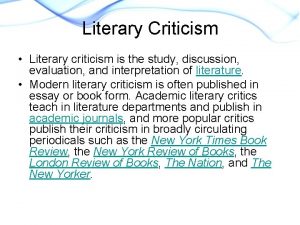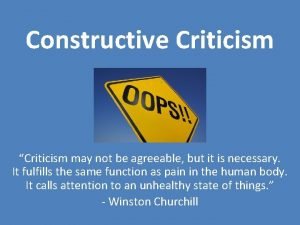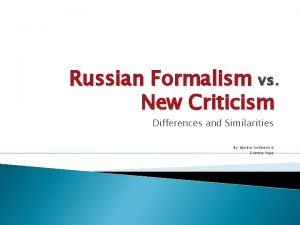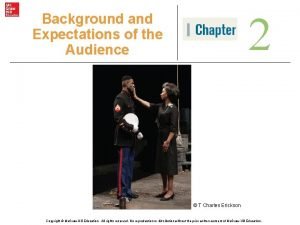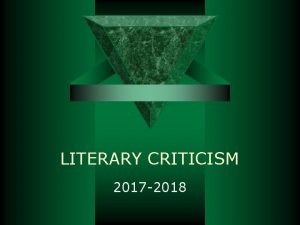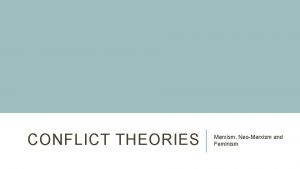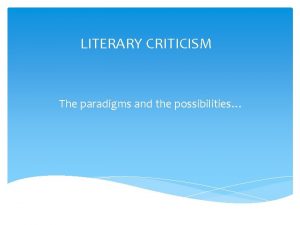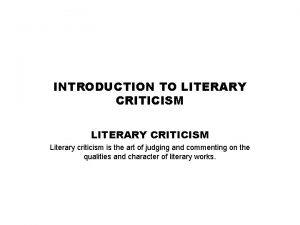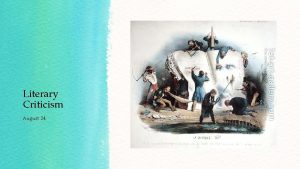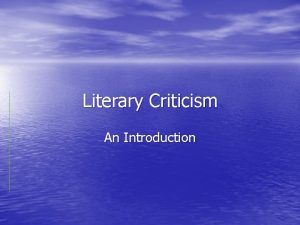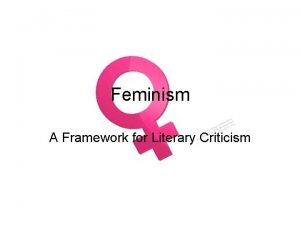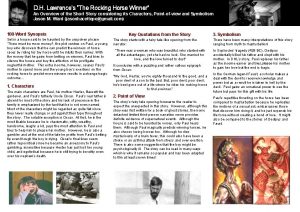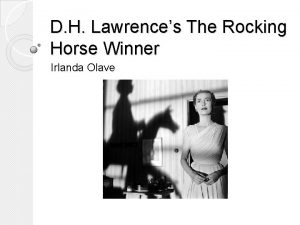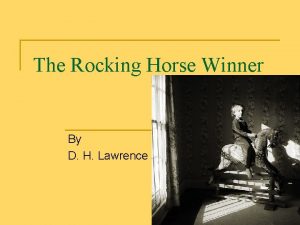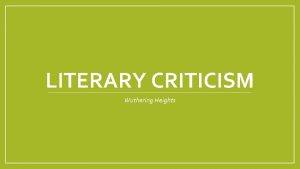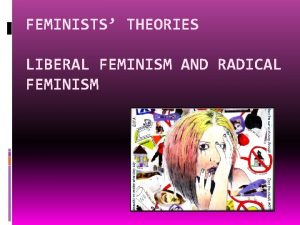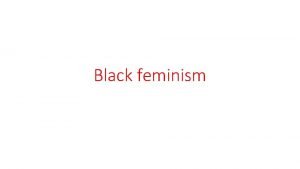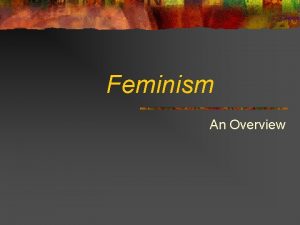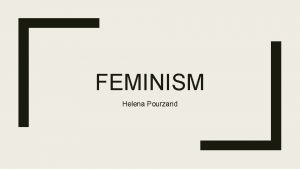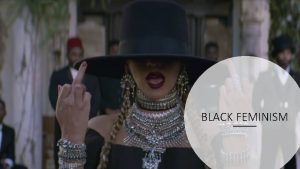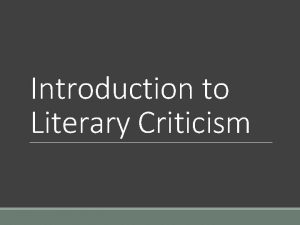Feminism Literary Criticism and The Rocking Horse Winner















- Slides: 15

Feminism Literary Criticism and The Rocking Horse Winner

Reader Response Criticism �Remember when we did poetry? You had to use your personal experience and understanding combined with information from the text to analyze and respond to what you read. This is somewhat the same and somewhat different.

Review: Literary Criticisms �A literary criticism asks the reader to look at a piece of literature from a different perspective. �You have to (your set of experiences and what you think) and replace it with a different, new bias or perspective. �For example: if I ask you, ‘Is Harry Potter a good movie? You might say yes or no.

Perspective When reading fiction (or non – fiction) readers see things from their point of view or perspective (Reader Response). • A reader sees characters, occurrences, and events through their own perspectives. • What if I asked you to change perspective? Do you think that would be easy? •

Changing Perspectives �What if I asked you the Harry Potter question again, but changed it to, “ ” you might have a different answer! �What if you are a man? You would ask, “What would a woman think of Harry Potter? ” Or about how Harry Potter treats women? Do you think that would be different?

Purdue University �Feminist criticism is concerned with ". . . the ways in which literature (and other cultural productions) reinforce or undermine the economic, political, social, and psychological oppression of women" (Tyson)

What is Feminist Literary Criticism? �This school of theory looks at how aspects of culture are inherently male dominated and this critique attempts to reveal the explicit and implicit way men and women treat women in their writing about women.

st 1 School of Feminist Thought � late 1700 s-early 1900's: writers like Mary Wollstonecraft highlight the inequalities between the sexes. � Activists like Susan B. Anthony and Victoria Woodhull contribute to the women's suffrage movement, which leads to National Universal Suffrage in 1920 with the passing of the Nineteenth Amendment in the United States.

2 nd Generation of Feminist Thought Early 1960 s-late 1970 s: building on more equal working conditions necessary in America during World War II � The National Organization for Women (NOW), formed in 1966 � Feminist political activism. Writers like Simone de Beauvoir (Le deuxième sexe, 1972) and Elaine Showalter established the groundwork for the dissemination of feminist theories dove-tailed with the American Civil Rights movement �

3 rd Wave of Feminism Early 1990 s-present: resisting the perceived over generalized, over simplified ideologies and a white, heterosexual, middle class focus of second wave feminism � Third wave feminism borrows from post-structural and contemporary gender and race theories to expand on marginalized populations' experiences. � Writers like Alice Walker work to ". . . reconcile it [feminism] with the concerns of the black community. . . [and] the survival and wholeness of her people, men and women both, and for the promotion of dialog and community as well as for the valorization of women and of all the varieties of work women perform" (Tyson 97). �

What to Look For In Literature: �How is the relationship between men and women portrayed? �What are the power relationships between men and women (or characters assuming male/female roles)? �How are male and female roles defined? �What constitutes masculinity and femininity? �How do characters embody these traits? �Do characters take on traits from opposite genders? How so? How does this change others’ reactions to them?

Critical Analysis Questions Continued �What does the work reveal about the operations (economically, politically, socially, or psychologically) of patriarchy? �What does the work imply about the possibilities of sisterhood as a mode of resisting patriarchy? �What does the work say about women's creativity? �What does the history of the work's reception by the public and by the critics tell us about the operation of patriarchy? �What role the work play in terms of women's literary history and literary tradition?

A summary of Feminist Criticism �Here we can view a very short 2 minute clip that summarizes Feminist Criticism.

Doing a Feminist Critique �I suggest you choose 2 or 3 questions from the previous list and ask those questions of characters in The Rocking Horse Winner �Ex. What are the power relationships between men and women (or characters assuming male/female roles)?

Your Analysis How do you think women are portrayed in the The Rocking Horse Winner? In your groups create a Google Doc and a short reflection on the overall treatment of women in the story. Be prepared to share your work with the class. Use some of the questions from to inform your response. What would Beauvoir think of the portrayal of women in the novel? Why? Use Beauvoir's discussion of Woman as Other to inform your decision.
 Climax of the rocking horse winner
Climax of the rocking horse winner Lulu rocking horse
Lulu rocking horse Moralist approach examples
Moralist approach examples Pneumobelt
Pneumobelt Gopresto/ppc/rocking
Gopresto/ppc/rocking Frozen section machine
Frozen section machine Homework 3:12 new signs
Homework 3:12 new signs Rocking chair therapy for dementia patients
Rocking chair therapy for dementia patients Constructive vs destructive criticism
Constructive vs destructive criticism Similarities of historical criticism and formalism
Similarities of historical criticism and formalism Bible verses about constructive criticism
Bible verses about constructive criticism Descriptive criticism vs prescriptive criticism
Descriptive criticism vs prescriptive criticism What is structuralist/formalist
What is structuralist/formalist Marxism and feminism similarities
Marxism and feminism similarities Reader response criticism
Reader response criticism Advantages and disadvantages of literary criticism
Advantages and disadvantages of literary criticism
